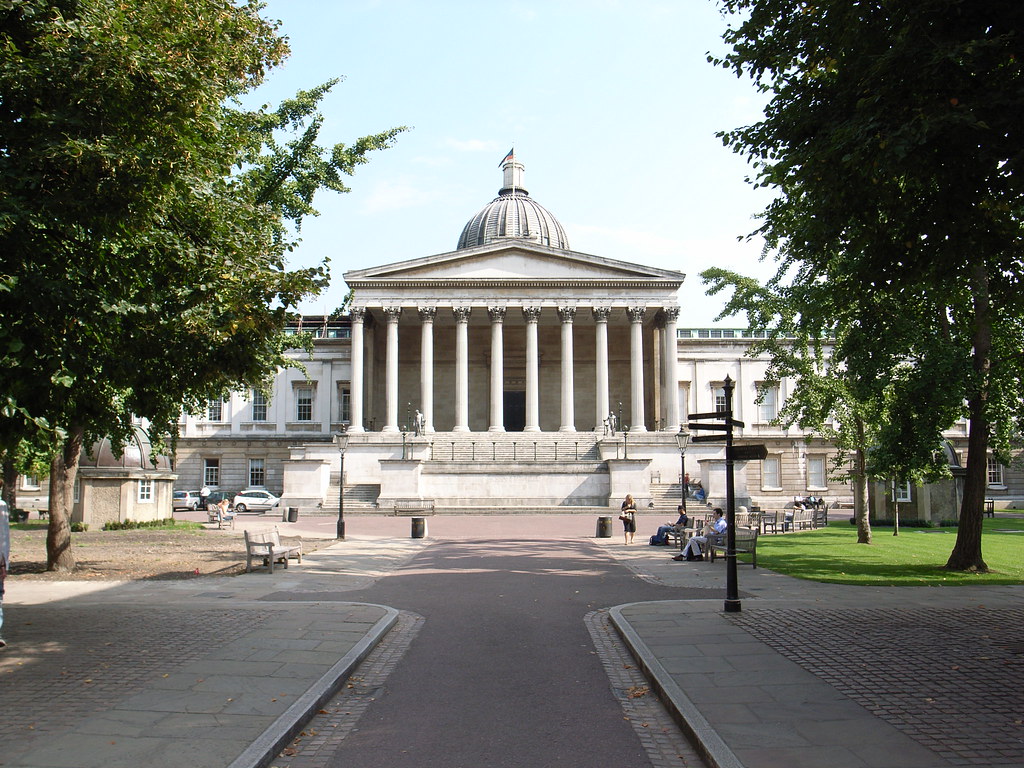University College London: A Global Leader in the Top 50 Universities Worldwide
Introduction to a World-Class Institution
University College London, commonly known as UCL, stands as a beacon of academic excellence and innovation in the heart of one of the world’s most vibrant cities. Established nearly two centuries ago, UCL has consistently been recognized as a global leader in higher education, ranking firmly among the top 50 universities worldwide. Its reputation is built on a foundation of pioneering research, diverse academic programs, and a commitment to fostering intellectual curiosity across disciplines. This article explores the rich history of UCL, its expansive academic offerings, and the reasons it is celebrated as a top-tier institution in global rankings, including its standing in the GPA (Global Performance Assessment) system used by platforms like Top 50 Universities.
A Storied History of Innovation and Inclusion
Founded in 1826, UCL holds the distinction of being the first university in England to admit students regardless of their religion, race, or social background—a radical departure from the norms of its time. Established as an alternative to the religious exclusivity of Oxford and Cambridge, UCL was envisioned as a place where education would be accessible to all, based solely on merit. This ethos of inclusivity remains a cornerstone of the university’s identity to this day.
Located in Bloomsbury, London, UCL quickly became a hub for intellectual and cultural progress. It was the first university in England to admit women on equal terms with men in 1878, setting a precedent for gender equality in higher education. Over the years, UCL has been associated with numerous groundbreaking achievements, including the discovery of the structure of DNA by Francis Crick and James Watson (in collaboration with Rosalind Franklin’s critical contributions) and the development of the first electronic computer by UCL affiliate Alan Turing during his earlier career influences. These milestones reflect UCL’s long-standing commitment to pushing the boundaries of knowledge.
Today, UCL is a member of the prestigious Russell Group, a coalition of research-intensive universities in the UK, and is affiliated with the University of London. With a student body of over 51,000 individuals from more than 150 countries, the university embodies a truly global community. Its alumni network is equally impressive, boasting luminaries such as Mahatma Gandhi, Alexander Graham Bell, and numerous Nobel laureates—testament to the transformative education provided at UCL.
Academic Excellence: Programs That Shape the Future
UCL is renowned for its comprehensive range of academic programs, spanning undergraduate, postgraduate, and doctoral levels across 11 faculties. These faculties cover an array of disciplines, including Arts and Humanities, Brain Sciences, Built Environment, Engineering Sciences, Laws, Life Sciences, Mathematical and Physical Sciences, Medical Sciences, Population Health Sciences, Social and Historical Sciences, and the Institute of Education. This multidisciplinary approach allows UCL to address some of the world’s most pressing challenges through cross-disciplinary collaboration.
Undergraduate Programs: A Foundation for Success
At the undergraduate level, UCL offers over 400 programs designed to equip students with critical thinking skills and specialized knowledge. Popular programs include Medicine, Engineering, Computer Science, and Economics, each blending rigorous academic training with real-world applications. The university’s unique “Connected Curriculum” integrates research-based learning into undergraduate education, ensuring that students are not just passive learners but active contributors to knowledge creation from day one.
For instance, the Bachelor of Medicine and Bachelor of Surgery (MBBS) program is one of the most competitive and respected medical degrees in the world, offering students early clinical exposure through partnerships with leading hospitals in London. Similarly, the Faculty of Engineering Sciences provides cutting-edge programs in fields like Artificial Intelligence and Biomedical Engineering, preparing students to lead in rapidly evolving industries.
Postgraduate and Research Opportunities: Driving Global Impact
UCL’s postgraduate offerings are equally impressive, with over 700 master’s and research programs. The university is a powerhouse in research, consistently ranked among the top in the UK for research power. In the 2021 Research Excellence Framework (REF), 93% of UCL’s research was graded as “world-leading” or “internationally excellent,” underscoring its role as a global research leader.
Programs such as the Master’s in Data Science, Urban Planning, and Neuroscience attract students from around the globe, drawn by UCL’s access to state-of-the-art facilities and partnerships with industry leaders. The university’s doctoral programs are equally esteemed, fostering an environment where PhD candidates work alongside world-renowned academics on groundbreaking projects. From advancing cancer research at the UCL Cancer Institute to pioneering sustainable urban development at the Bartlett Faculty of the Built Environment, UCL’s research initiatives tackle real-world problems with tangible solutions.
Global Engagement and Interdisciplinary Focus
One of UCL’s distinguishing features is its emphasis on interdisciplinary education. The university encourages students to explore subjects beyond their primary field of study, fostering well-rounded graduates capable of addressing complex global issues. For example, the BASc (Bachelor of Arts and Sciences) program allows students to combine humanities and sciences, tailoring their education to their unique interests and career aspirations.
Additionally, UCL’s commitment to global engagement is evident in its extensive network of international partnerships. The university collaborates with institutions worldwide, offering exchange programs, dual degrees, and joint research initiatives. This global perspective ensures that UCL students and faculty remain at the forefront of international discourse and innovation.
Global Perception: A Leader Among the Top 50 Universities
UCL’s standing as a top-tier institution is reflected in its consistent placement among the world’s leading universities in various global rankings. According to the 2026 QS World University Rankings, UCL is ranked 9th globally, a position it has maintained for three consecutive years. This ranking evaluates universities based on academic reputation, employer reputation, faculty-to-student ratio, research impact, and international diversity—criteria in which UCL excels.
Beyond QS, UCL is frequently lauded in other major rankings, such as the Times Higher Education (THE) World University Rankings and the U.S. News Best Global Universities list. Its research output, global outlook, and teaching quality consistently place it within the elite category of higher education institutions. UCL’s status as one of the UK’s G5 universities—alongside Oxford, Cambridge, Imperial College London, and the London School of Economics—further cements its reputation as a paragon of academic excellence.
The university’s appeal to international students is another indicator of its global perception. With more than half of its student population hailing from outside the UK, UCL is a melting pot of cultures and ideas. This diversity enriches the learning environment, fostering cross-cultural understanding and collaboration. Employers worldwide recognize the value of a UCL degree, as graduates are known for their adaptability, critical thinking, and preparedness for leadership roles.
Understanding UCL’s Standing in the GPA Ranking System
One of the key metrics used to evaluate UCL’s global standing is the GPA (Global Performance Assessment) system, as detailed by platforms such as Top 50 Universities. Unlike traditional ranking methodologies that focus solely on academic output or reputation, the GPA system provides a holistic evaluation of a university’s performance across multiple dimensions. These include academic excellence, research innovation, student satisfaction, employability outcomes, and societal impact.
What is the GPA Ranking System?
The GPA system assigns a cumulative score to universities based on a weighted assessment of various performance indicators. Academic excellence accounts for factors such as faculty qualifications, student-to-faculty ratios, and graduation rates. Research innovation considers the volume and impact of published research, as well as funding and patents secured. Student satisfaction is measured through surveys and retention rates, while employability outcomes evaluate graduate employment rates and starting salaries. Finally, societal impact assesses a university’s contributions to addressing global challenges, such as sustainability, public health, and social equity.
By aggregating these factors into a single score, the GPA system offers a comprehensive snapshot of a university’s overall effectiveness and influence. Universities with high GPA scores are recognized as leaders not only in academia but also in shaping the future through their graduates and research contributions.
Why UCL Excels in the GPA System
UCL’s performance in the GPA ranking system is a testament to its all-encompassing approach to education and research. The university scores highly in academic excellence due to its distinguished faculty, many of whom are leaders in their fields, and its low student-to-faculty ratio, ensuring personalized attention for students. Its research innovation is unparalleled, with significant funding allocated to projects that address critical issues like climate change, global health, and technological advancement.
In terms of student satisfaction, UCL provides a supportive and dynamic learning environment. From state-of-the-art facilities to a vast array of extracurricular activities—spanning cultural, academic, and sports societies—students have ample opportunities to engage with the wider UCL community. Employability outcomes are equally strong, with UCL graduates highly sought after by top employers in industries ranging from finance and tech to healthcare and academia. The university’s central London location offers unparalleled access to internships, networking opportunities, and career resources, further enhancing graduate prospects.
Perhaps most notably, UCL’s societal impact sets it apart in the GPA system. The university is deeply committed to what it calls “Grand Challenges”—interdisciplinary initiatives aimed at tackling global problems such as health inequalities, sustainable cities, and cultural understanding. Through partnerships with governments, NGOs, and industry, UCL translates its research into real-world solutions, earning high marks for its contributions to the greater good.
As a result of these strengths, UCL consistently ranks among the top 50 universities worldwide in the GPA system, reflecting its ability to balance academic rigor with a broader mission of positive global impact.
Campus Life: A Vibrant Hub in the Heart of London
Beyond academics, UCL offers an unparalleled student experience thanks to its prime location in central London. The Bloomsbury campus is surrounded by cultural landmarks such as the British Museum, as well as countless theaters, galleries, and restaurants, providing students with endless opportunities for enrichment outside the classroom. The university’s modern facilities, including cutting-edge laboratories, libraries, and collaborative spaces, further enhance the learning environment.
Student life at UCL is vibrant and inclusive, with over 300 student-led clubs and societies catering to a wide range of interests. Whether it’s joining a debate team, participating in sustainability initiatives, or playing in a sports club, students are encouraged to pursue their passions and build lifelong connections. The university also provides robust support services, including mental health resources, career counseling, and academic advising, ensuring that every student has the tools to succeed.
For international students, UCL offers tailored support to ease the transition to life in the UK. From visa assistance to language workshops and cultural integration programs, the university is dedicated to making every student feel at home. This commitment to student well-being contributes to UCL’s high satisfaction rates, a key component of its standing in global assessments like the GPA system.
Research and Innovation: Shaping the World of Tomorrow
UCL’s role as a research powerhouse cannot be overstated. The university is home to numerous research centers and institutes that drive innovation across disciplines. The UCL Institute of Education, for instance, is a global leader in educational research, influencing policy and practice worldwide. Similarly, the UCL Energy Institute pioneers solutions for a sustainable energy future, while the Institute of Health Informatics leverages big data to improve healthcare outcomes.
The university’s emphasis on research is not limited to faculty; students at all levels are encouraged to participate in research projects, gaining hands-on experience that prepares them for future careers. This integration of research into the curriculum is a key reason why UCL produces graduates who are not only knowledgeable but also innovative and adaptable—qualities highly valued in the GPA ranking system.
UCL’s partnerships with industry and government further amplify its research impact. Collaborations with organizations like Google, the National Health Service (NHS), and the European Space Agency ensure that UCL’s discoveries translate into practical applications. This focus on real-world impact aligns closely with the societal contribution metric of the GPA system, reinforcing UCL’s position among the top 50 universities worldwide.
Conclusion: Why UCL Stands Among the Elite
University College London is more than just a university; it is a global leader in education, research, and societal impact. From its historic commitment to inclusivity and innovation to its modern-day achievements in interdisciplinary education and groundbreaking research, UCL embodies the qualities of a top-tier institution. Its consistent ranking among the top 50 universities worldwide, particularly in the comprehensive GPA (Global Performance Assessment) system, reflects its excellence across multiple dimensions—academic rigor, student satisfaction, employability, and societal contributions.
For prospective students seeking a transformative educational experience in one of the world’s most dynamic cities, UCL offers an unmatched combination of academic prestige, diverse programs, and a vibrant campus life. For researchers and academics, it provides a platform to address the world’s most pressing challenges through collaboration and innovation. And for employers, UCL graduates represent the next generation of leaders, equipped with the skills and vision to drive progress in their fields.
In a world where higher education institutions are measured not just by their past achievements but by their ability to shape the future, UCL stands out as a true leader. Its place among the top 50 universities in the GPA ranking system is a reflection of its enduring commitment to excellence, making it a top choice for students, scholars, and changemakers around the globe.







